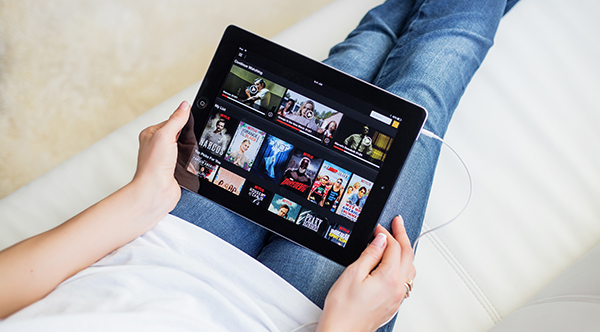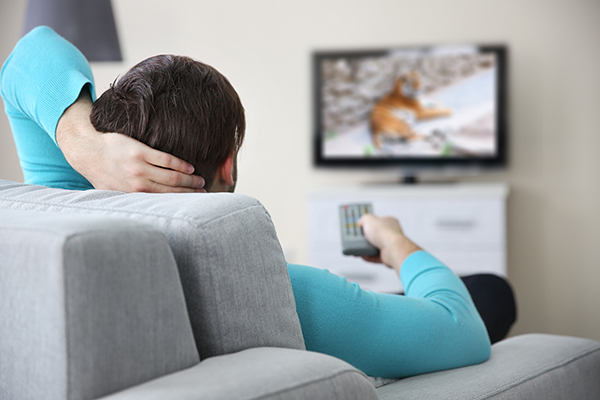Sight and sound: in-room entertainment
When it comes to in-room entertainment, casting will be the buzzword for 2019, as guests will use it to watch their own content on ultra-high-definition TVs, as Elly Earls reports
And weâre not just doing it at home. Whether weâre on trains or waiting for planes, we want to be able to log on and pick up where we left off last night. Even in hotel rooms, where we used to look forward to watching movies we didnât have access to at home, the tables have turned. The challenge for hoteliers today is not to beat what we have access to in our living rooms, but to match it.
âThe role of the hotelier has changed from a provider of entertainment to a provider of a home-like infrastructure to enable the guest to live their passions,â says Markus Letuha, product manager for TV and internet at hotel technology provider Hoist Group.
Olivia Byrne, company director at Londonâs Eccleston Square Hotel, agrees. âClients want to watch whatever they were watching at home in the comfort of their hotel room. A lot of guests now have a Netflix account, and hotels donât need to supply as much TV content as they used to. However, they need to offer a high-definition screen and the ability to share content from a guestâs device to the hotel screen.â
The quickest and simplest way for hotels to meet this demand is with a hospitality-specific casting solution, like the one currently being installed at Eccleston Square Hotel, which will enable guests to cast the content from their smartphone or iPad directly onto the hotelâs TV screen.
âYou canât just buy Chromecast and stick it in a hotel room,â says James Grant, marketing manager at digital TV and audio-visual equipment provider Airwave. A hospitality-certified product, such as Airwaveâs Chromecast for Hotels is a must.
A small device that plugs into a TVâs HDMI socket, Chromecast for Hotels not only allows guests to use their own device as a remote control to cast their content onto the TV, itâs also configured to prevent interference between rooms and housed in a protective casing to prevent tampering and theft.
For their part, TV manufacturers are working to make the new technology as discreet as possible. LG, for example, has created a Chromecast cover, which can be applied to the back of the TV, enabling the dongle to be hidden from view.
A hotel-specific Smart TV that protects guestsâ passwords and security by automatically logging out of their accounts is the other option for hoteliers. But, stresses Forbes Professionalâs Hannah Forbes, casting is the simplest and most secure way of giving access to the content that hotel guests want to access. âIt is definitely the way forward as far as hotel TV content is concerned,â she says.
The new WiFi standard
Of course, casting will only work if a hotel has enough bandwidth, which is why more hotels have moved from installing internet access points in corridors that might cover three or four bedrooms to fitting one in every room. âThe WiFi is at the bottom of it all,â Grant says.
And while excellent free WiFi is already an expectation for guests, the necessary infrastructure to be able to use it to watch your own content isnât far behind.
âWiFi used to be a commodity that many hoteliers charged for as an extra service. However, now guests expect WiFi to be free of charge and of good quality. Almost like another utility, such as hot water â" guests take WiFi as a given,â says HOSPA chief executive Jane Pendlebury.
âWhen it comes to in-room entertainment, expectations arenât quite at that level yet, but guests are becoming increasingly disappointed if they canât access the same abundant choice that they have at home. Hotels that deliver the necessary service offering around this will benefit from its differentiating factor, but it wonât be long before itâs the standard as opposed to the standout.â
In the meantime, she says, guests continue to expect TV in their local language, news and an option to watch movies and box sets on demand.
âFlexibility of use for your technology is a vital element of how hotels should approach in-room entertainment, as there are varying requirements depending on the type of visitor demographic you can expect in your room,â says LG Electronicsâ hotel TV sales manager Barrie OâNeill.
Sky's the limitÂ
Skyâs Sky Select service, the first centralised HD distribution system in the UK aimed at hoteliers, was designed specifically to help operators provide a flexible content offer. It allows them to deliver HD-quality sport, entertainment and movie content to multiple TVs across their hotel while also incorporating Freeview and foreign channels.
In addition, hoteliers can easily swap existing channels and add more to suit their guest profile at any time. They also have the choice to incorporate a tailored welcome channel to greet their guests alongside Skyâs familiar EPG.
Beyond the guest room, the must-have TV content continues to be Sky Sports, which hoteliers can use to attract guests into bars and other public areas and encourage them to spend on food and drink.
In addition, many hotel and bars are incorporating management software into their public TV screens so they can advertise special offers, either on a full or split screen. âAlthough digital signage is expensive, they can make their money back by advertising offers like happy hour,â Grant says.
LG is also seeing a growth in demand for creative shapes and experiential displays, such as video walls and LED displays, which offer immersive viewing experiences and canvasses for sports, hotel and beauty content.
Bigger is betterÂ
When it comes to hardware, size increasingly matters according to Forbes. âAs consumers are becoming accustomed to watching larger screen sizes at home, there has been a steep increase in in-room television screen sizes,â she says. âWhile previously 26â-32â televisions sufficed, there has been a move towards 40â or larger.â
Hotels that are looking to exceed guestâs expectations â" particularly in the four- and five-star segment â" should be looking for slim TVs that can be hung on the wall. Ultra-high-definition (UHD) is also fast becoming the norm at the high end of the market, although weâre still a way off 8k technology being required.
As Letuha explains. âIf and when the hotel market adopts the next level of screen resolution mainly depends on two factors: the human eye and the availability of content.
âWhile the number of 4k TV channels is constantly increasing, the investment in 8k technology for production and broadcasting is unlikely to happen for the linear content world in the near future. Similarly, when it comes to on-demand and online streaming, the majority of content is starting to become available in 4k, but 8k technology typically hits a limit.â
For example, Netflix recommends 5MB for SD and 25MB for UHD, which suggests 50MB would be required for a single 8k stream. âIf we apply this to a 100-room hotel and a desire to serve at least 20% of the rooms simultaneously, we would be talking about 1GB just for this service,â Letuha says.
âIf the existing network is ready to handle this traffic is a question on top, but typically the external internet line is the bottleneck. Long story short, we see SD- and HD-ready disappearing, a decision between FHD and 4k resolution depending on guest room size, and 8k not entering the hospitality market any time soon.â
For Forbes, the cutting edge in terms of hardware is the LG OLED TV, with added industry-specific functionality, including fully customisable in-room information channels.
âThese provide an ideal platform for communicating branding, welcoming, promotional and informative content. These channels are also extremely popular as they can save money on print cost by removing paper in-room guest directories and uploading to the TV channel. They can also generate revenue by being sold as an advertising space to external businesses,â she says.
Audio expectationsÂ
In-room audio may still be less of a priority for hotel guests than TV, but with more and more guests bringing along their own music as well as video content when they travel, thereâs no question itâs becoming more important.
As a general rule, hotel TVsâ built-in speakers are suitable for smaller and standard rooms, whereas a suite or luxury offering might warrant an investment in external audio bars. Technology providers are also seeing growing demand for high-quality Bluetooth, wireless and docking speakers.
For Alex Munro, brand director at Q Acoustics Install, which offers a range of speakers that sit within the ceilings or in the walls, discretion is everything.
âThere is a common misconception that good quality speakers are bulky and take up a lot of room,â he says. âHowever, most installed speakers are discreet and easily inserted into the fabric of the building without compromising on the sound quality.â
CitizenM: an all or nothing technology roll-out
Since launching in Amsterdamâs Schiphol Airport 10 years ago, affordable luxury hotel brand CitizenM has provided free high-quality Wi-Fi and video on demand.
In 2015, the group also began rolling out Apple TV and casting solution Miracast to all of its guest rooms globally.
Plus, guests can control everything from the window blinds to the lights, temperature and music through in-room âMoodPadsâ.
âWhen we do something at CitizenM, we donât just do it at one hotel and shout it from the rooftops, and then 10 years later roll it out at 20% of hotels. We do it and do it in all of our hotels rooms, because we feel like itâs a brand promise you make to the guest and you cannot do that by half,â says chief operations officer Michael Levie.
CitizenM rolls out innovative technology so rapidly because of the philosophy itâs had from the beginning: âWe basically have a foundation of technology on top of which you can put all kinds of novelty,â Levie explains.
He thinks the challenge the hospitality industry is facing is that operators tend to focus on guest-facing technology rather than the underlying foundation. âThe consistency of rolling something out to your entire network of hotels, or whether youâre able to move on the latest gadgets or jump on board when you want to, depends on how well your technology is structured,â he says.
Digital Summit 2018: Guest obsession, data harmony and marketing to millennials >>
On demand: putting the TV at the centre of your hotel room >>
















